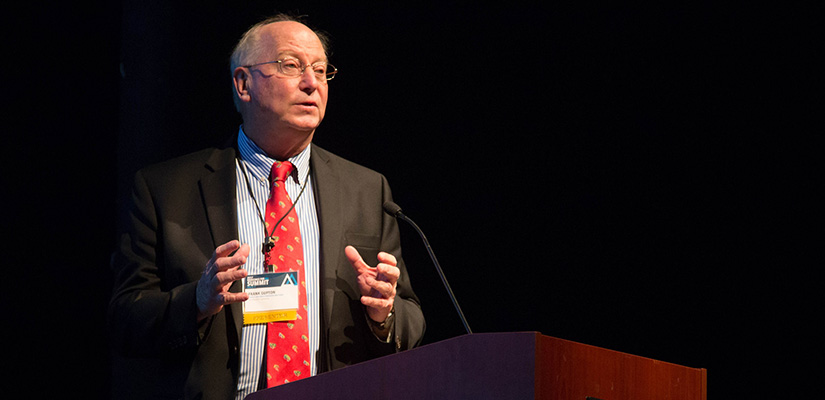By Rebecca E. Jones
The inaugural Medicines for All Summit convened leaders from academia, industry, government and nonprofits to advance an urgent goal: increasing access to global health care to save more lives.
The summit was organized by the Virginia Commonwealth University School of Engineering’s Medicines for All Institute (M4ALL) and was held Nov. 8-9, 2017, at the Virginia Museum of Fine Arts. The Bill & Melinda Gates Foundation recently awarded a $25 million grant to fund the Medicines for All Institute’s work on a wide range of essential global health treatments.
The two-day summit centered on why access to cost-effective medicines is such a challenge and how technology-based solutions can improve global access to affordable medicines. Researchers from universities including the Massachusetts Institute of Technology and South Africa’s Nelson Mandela Metropolitan University and Virginia Commonwealth University joined leaders from the Gates Foundation, the Clinton Health Access Initiative, USAID and major pharmaceutical manufacturers to forge paths forward. Undergraduate and graduate students from VCU, as well as chemistry students from John Marshall High School in Richmond, also participated in the event.
Globalization and collaboration are the future of health care policy, said keynote speaker Gabrielle Fitzgerald, M.P.A., founder and CEO of nonprofit action tank Panorama. She emphasized that globalization in health care is not confined to the developing world.
“Once-distant diseases are now at our door,” she said, pointing to recent outbreaks of Ebola and Zika viruses, and the return of measles. As people now rapidly move across the globe, she said, “disease anywhere can become disease everywhere.” Collaboration across the academic, industry and government sectors to break down silos is crucial, Fitzgerald said, or we risk being unprepared to address the medical impacts of pollution or the next global disease outbreak.
Redesigning manufacturing methods for lifesaving generics is key to answering that call, said. B. Frank Gupton, Ph.D., Floyd D. Gottwald Chair and chair of the Department of Chemical and Life Science Engineering in the VCU School of Engineering and founder of M4ALL. Gupton outlined M4ALL’s program to reduce the cost of generic drugs’ active ingredients, then transfer those cost-saving methods to global collaborators for production and distribution. “I don’t like lab curiosities,” he said. “I like innovations that solve a problem.”
Generics are ripe for problem-solving innovations, Gupton said, because they often retain inefficiencies in production methods from the innovator drugs they replicate. To earn U.S. Food and Drug Administration approval, generic manufacturers must show equivalence to the original drugs, which eliminates incentives for process improvement. When M4ALL began targeting individual generics, they delivered significant product output at no extra cost. These include increases of 39 percent for the HIV drug nevirapine, 36 percent for the antifungal drug fluconazole and 15 percent for the antimalarial drug hydroxychloroquine.
Innovation in generics is also an imperative to provide more “green” and environmentally friendly output, said Berkeley W. Cue, Jr., Ph.D., a consultant and industry veteran who led Pfizer’s green chemistry efforts for 28 years. In his address to the summit, Cue talked about the global scale of generic pharmaceuticals and pointed out that nearly 95 percent of prescriptions in the U.S. are generics. Because of time constraints, those manufacturers have been slow to adopt green chemistry, the chemical processes that reduce or eliminate generation of hazardous substances necessary in the current production processes. Noting that the M4ALL process advances green chemistry, Cue congratulated Gupton and Tyler McQuade, Ph.D., professor of chemical engineering, on their 2018 ACS Award for Affordable Green Chemistry.
Redesigning the production processes for key pharmaceuticals was another theme of the summit. Timothy Jamison, Ph.D., Robert R. Taylor Professor of Chemistry at the Massachusetts Institute of Technology, and his group adapted the antibiotic ciprofloxacin for continuous flow processing. Cipro is usually produced batch by batch. When redesigned to be produced continuously in a flow reactor, without the stops and starts of batch chemistry, processing time went down dramatically and drug yield increased.
The summit sounded a call for transfer of knowledge and ideas, in addition to green manufacturing and higher production output. “Our primary activities are transforming pharmaceutical manufacturing, reinventing the supply chain — and creating the next generation of global scientists and engineers,” said Eugene Choi, Ph.D., executive director of M4ALL. “We now get approached by students worldwide who are interested in what we’re doing. It’s a self-feeding ecosystem.”
This ecosystem is set to expand over the next five years as M4ALL scales up to tackle 13 critically needed drugs including treatments for HIV/AIDS, malaria and tuberculosis.
“This is not just about chemistry, it’s about vision and the right players,” Gupton said. “We are not just bringing molecules together. We’re bringing people together to solve a problem.”
